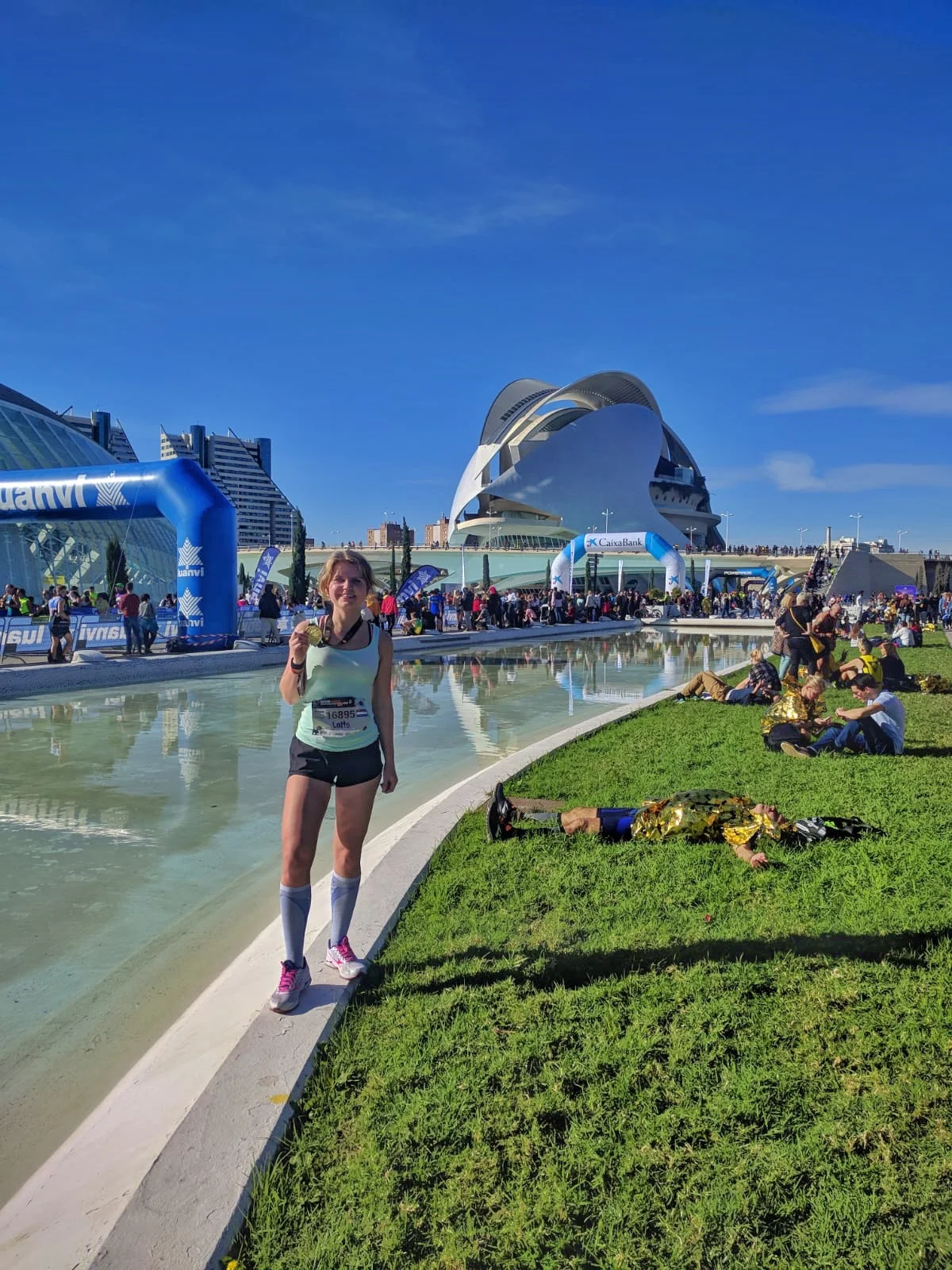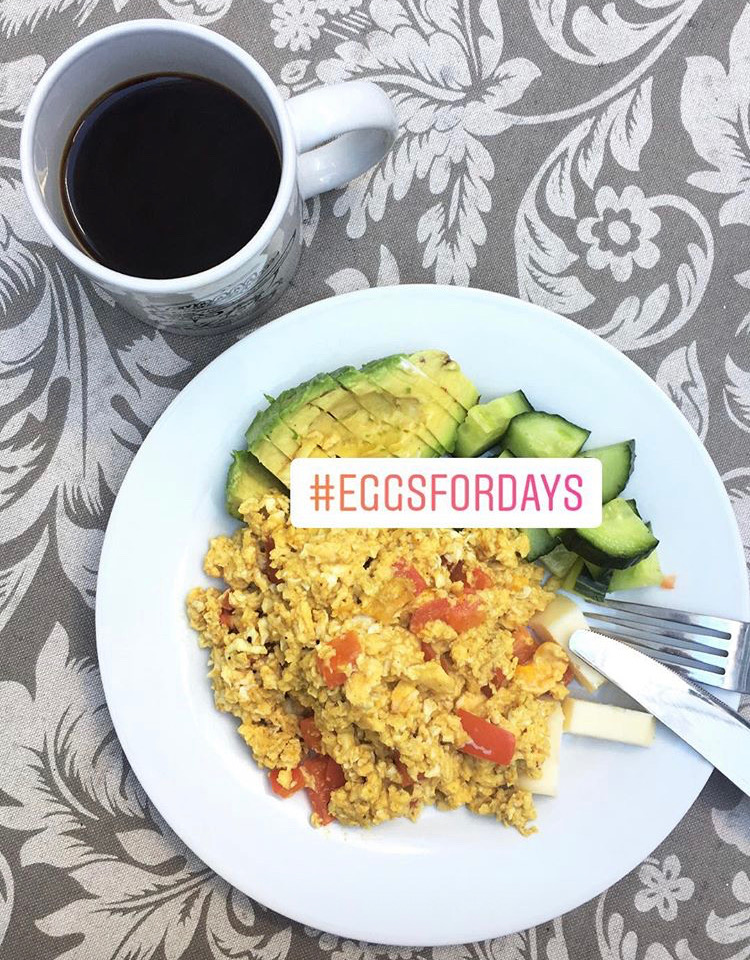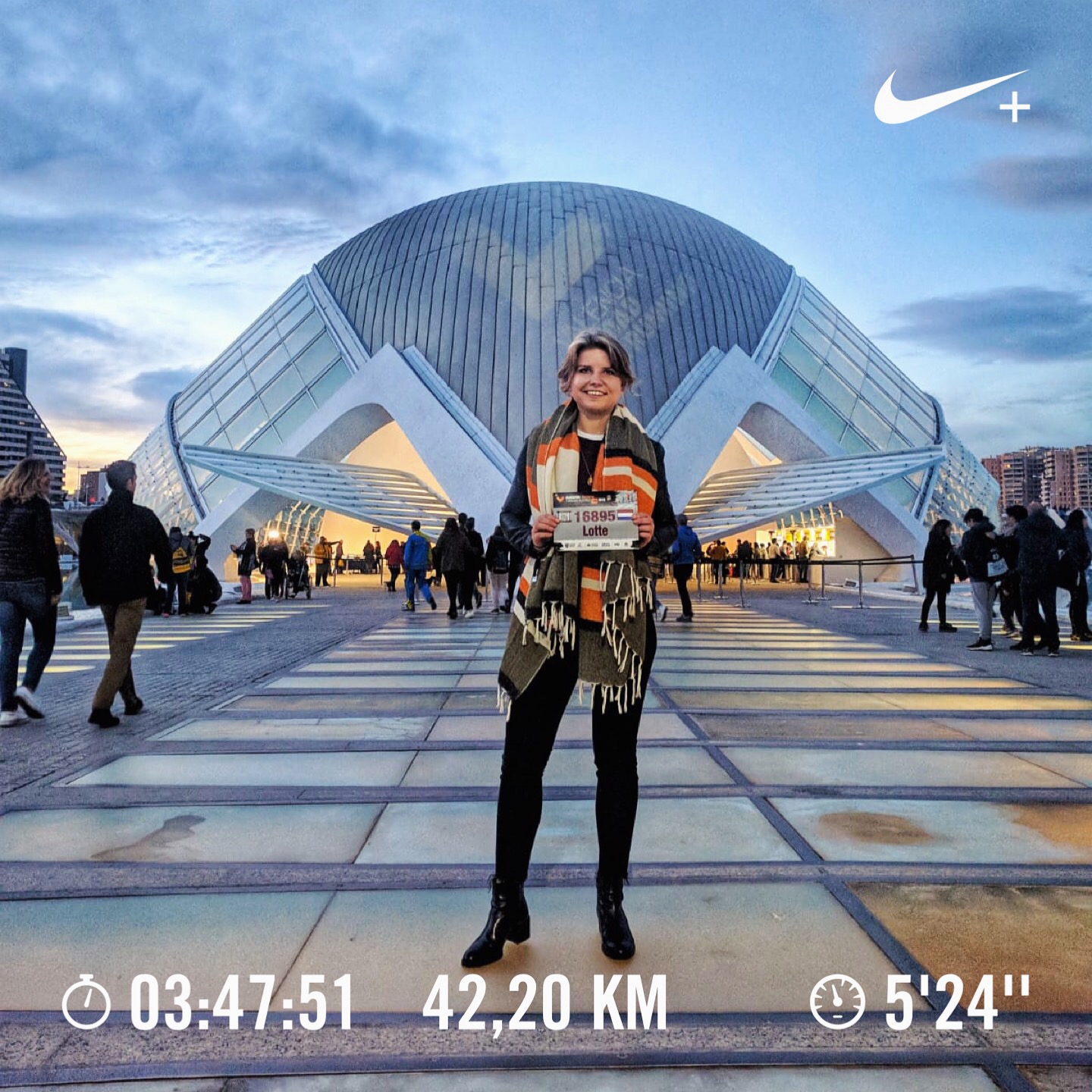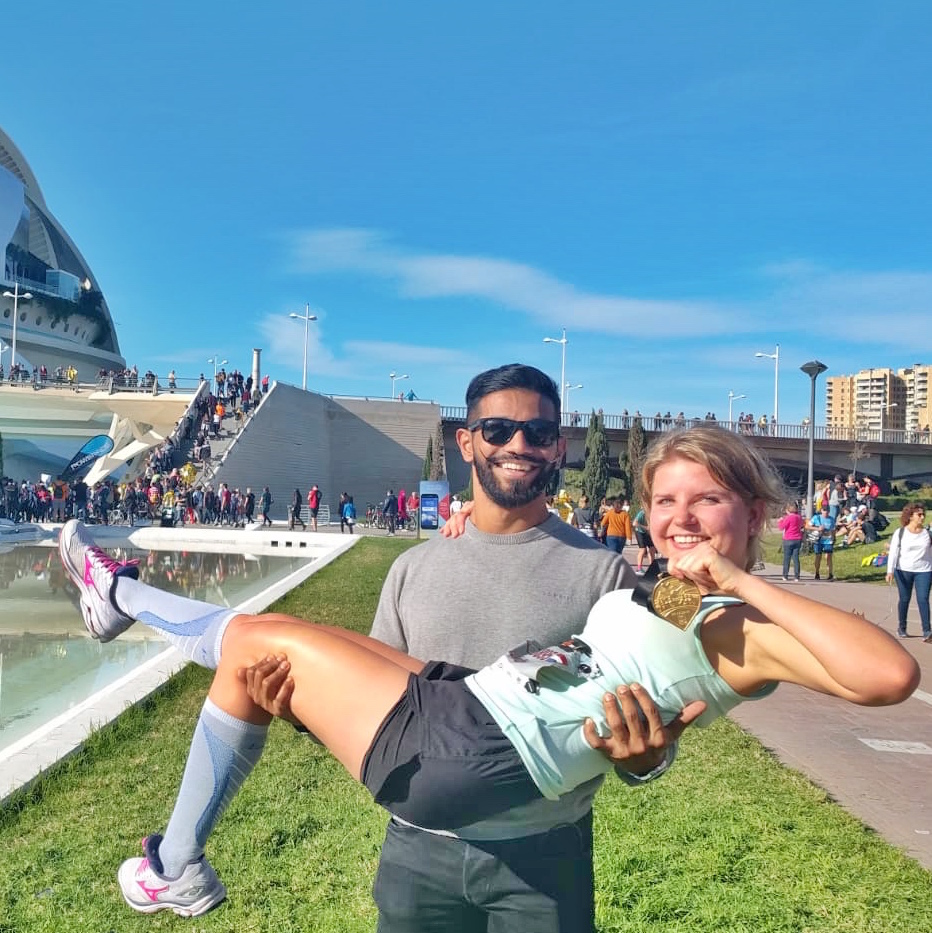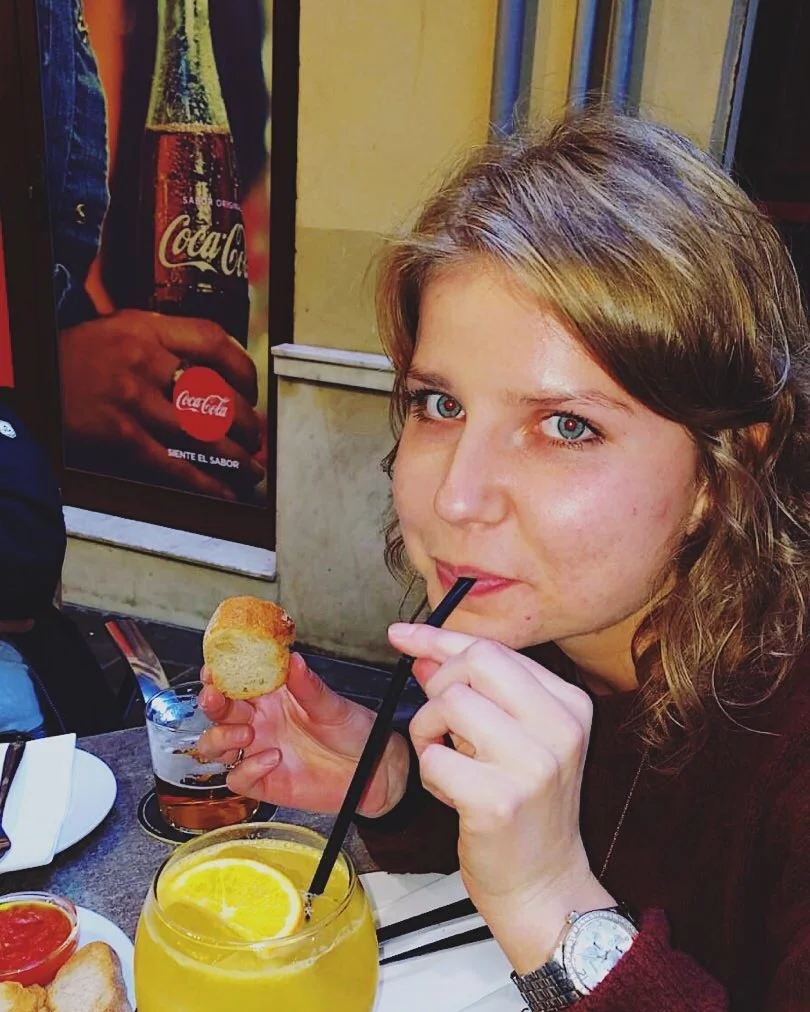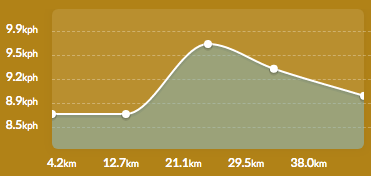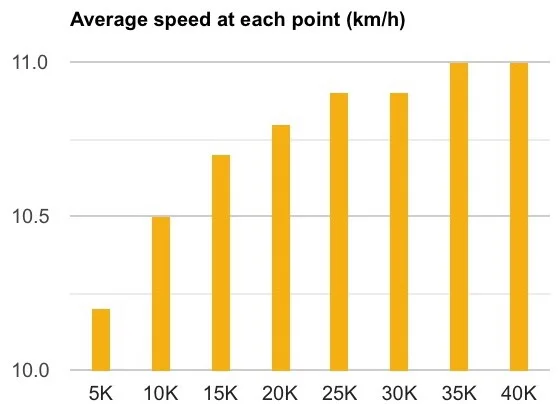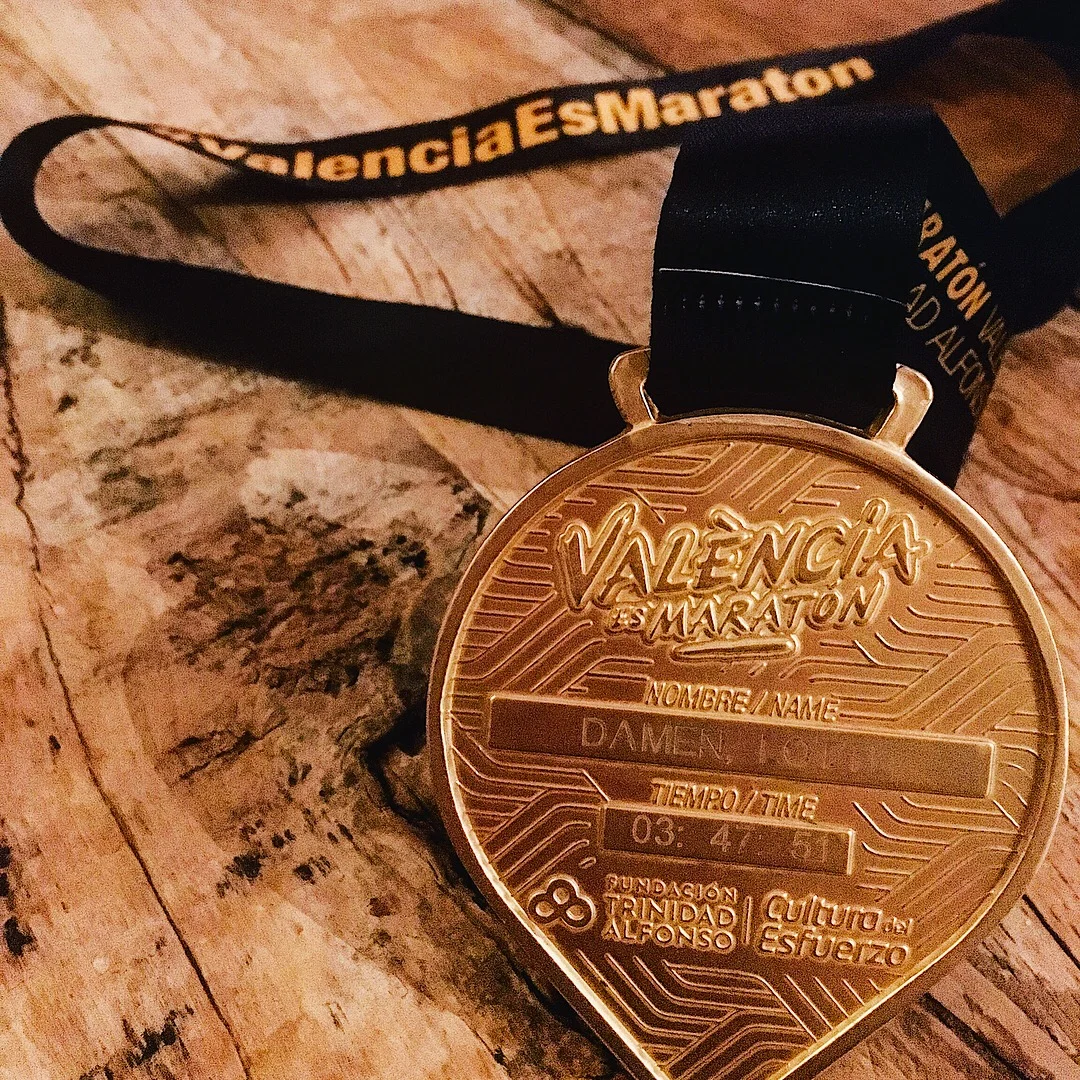Running a Keto Marathon versus a Carb Loading Marathon - How I Crushed my Best Time
Experience from Keto Dietitian Lotte Damen!
After running 42.195 KM in Valencia on nothing but water and electrolytes, I am more than thrilled to share this amazing experience with you. Since I ran my first marathon in 2017 on a high-carb vegan diet, I thought it would be an awesome idea to try running a marathon on keto as a sort of N=1 case study. The reward? I broke my first marathons time with 50 minutes, and I totally experienced a runners high along the way. Are you a runner who is interested in thriving on a keto diet? Find out how I did it and experience it yourself!
In this article, you can read about my personal experience and my view on this journey. In addition, find information on my nutrition and training program before the marathon, nutrition during the marathon, and how I recovered after the marathon.
Which differences did I notice according to performances and energy levels, compared to last year’s run?
Why I gave running a marathon on keto a shot!
The time of carbohydrate loading and eating bananas before a race, and taking sugary sport gels and drinks during runs might be over soon. There is growing interest in using fat as a primary fuel and carbs are no longer seen as the only efficient energy source for long-distance runners. Currently, an increasing amount of endurance athletes covering extreme distances such as triathlons decide to run on fat. Jeff Volek, Stephen Phinney, and Tim Noakes spent decades studying the effects of a low-carb, high-fat approach in endurance athletes, and more and more research indicates that a ketogenic diet can have significant positive effects on energy levels and endurance performances.
To be able to provide the best advice to my clients with a goal of improving their endurance performances, I decided to bring everything I learned over the last year into practice.
So what did I exactly do to be able to run in a fat-adapted state, and how did it end? Before we dive into the practical aspects of running a keto marathon, it is important to understand the differences between the mainstream way of carb-loaded running and the groundbreaking way of fat-adapted running.
Keto running versus carb running
The basics of keto running, and carb running
In this previous article, you can read more about using carbs as fuel versus using fats as fuel. How does this work in endurance athletes?
In general, a runner’s’ body first uses stored carbohydrates (glycogen) as fuel, since this is metabolized quicker than fats. Therefore, many runners still think carbohydrate loading is necessary to run a great race. The thing is that the body can only store a few thousands of calories from glucose. Therefore, you need to load up during the race. This is exactly what I did during my first marathon. I honestly didn’t know anything about running on keto, and I just applied what most runners have been taught. Following a higher-carb diet, and preloading with LOTS of carbs one week before the actual race. However, when you run on sugar and carbs, your body basically depends on this type of fuel, and cannot optimally perform without it. If you don’t replenish on time, it eventually results into a hard crash also known as hitting the wall or bonking. Because of this, most runners and sports dietitians believe in the fact that you have to replenish carbohydrates on time to prevent this situation. Stubborn as I am, I don’t believe there is only one truth and to me this whole idea of bonking just sounded as something that could be prevented in another way. I had experienced it during my first marathon and it almost made me stop running for good since I felt terrible after I finished. I didn’t want to lose my joy in running!
So in July 2018 I started my experiment. I decided to completely do the opposite compared to my first marathon, after I found out your body can store about 20 times as many fat calories compared to carbohydrates. Fats are the body’s ‘emergency’ fuels, and your body only turns to these if glycogen supply is lacking. If your body uses stored fats as fuel, you have a tank of about 40,000 calories to help you run faster and longer. Wow! There’s no need to replenish, you almost have an infinite energy supply. A situation that every runner wants to achieve of course!
It takes months of dedication to become fully fat-adapted
Of course, running a marathon on keto is not something you can decide the week before your race. It takes a lot of determination, dedication, and months of training to benefit from fat-adapted running, and to efficiently burn stored fat for energy. In July, I started to reduce my carbohydrate intake till a maximum of 30 grams per day. Falling off the wagon during the first weeks was not an option, since you basically have to start your ketosis journey all over if you do so. You have to realize that becoming a fat-adapted runner requires a complete physical and mental lifestyle change! Basically, your whole life starts to evolve around your trainings, and eating keto.
Luckily, it’s all worth it, and a high-fat diet provides a steady long-lasting energy fuel throughout the day. I allowed myself at least one month to get used to this new lifestyle, and to slowly build up my mileage per week. Therefore, starting the ‘most intense part’ of my training program was actually not as hard as I thought it would be!
Practical implementation of running a keto marathon before the race, during the race, and after the race
Training and nutrition during the months prior to my marathon
For about 5 months I followed the Standard Keto Diet. I have to admit I didn’t calculate my macros, since I know it mostly by heart after studying Nutrition and Dietetics for 4 years. Also, the amount of time I had didn’t really allow me to do so (I worked 50-60 hours a week). On average, I consumed a daily amount of 2000-2200 calories, whereof 75-80% fat, 15% protein, and 5-10% carbohydrates. This, divided into three meals. The main part of my diet consisted of whole food products such as leafy vegetables, avocados, nuts and seeds, fatty fish, grass fed butter, olive oil, coconut oil, eggs, and cheese and full-fat dairy in moderation.
During my training period, I ran 3 times a week on average, whereof one short tempo run, one slower long run, and one interval training. After the first 2 months I increased my mileage, and I also started to experiment with intermittent fasting and fasted runs. I never thought I would be able to do a fasted run, but I felt amazing doing so! At least once a week I implemented a fasted run or a 16 hour fast. The reason for these fasted runs was as follow: to reduce my body’s available glycogen to ‘train’ it to burn stored fat more efficiently during the final miles of my marathon.
I only experimented with fasted running after 2 months, because if you’re not fat-adapted yet, you won’t experience a lot of benefits from it. Also, I never ran more than 1,5 hour in a fasted state, and I always ran right after waking up. What I noticed, was that both my energy levels and average speed increased from doing these runs.
I performed my long runs mostly a few hours after a meal. On days I ran more than 1,5 hour, I took a running backpack with me from Decathlon, filled with water and 2 teaspoons of a liquid electrolyte mix. After those runs, I felt like the recovery time was way shorter compared to running longer runs on a high-carb diet.
Nutrition right before and during my marathon
3 hours before my marathon I had my last meal: a fat-nutrient-dense breakfast. This meal included 3 eggs, shredded cheese, a lot of grass fed butter, and ½ avocado. With this, I also drank one coffee with cream, and butter. Before my race, I prepared a 1-liter sack with 2 teaspoons of a liquid electrolyte mix, and ½ lemon juice. That’s all I had during my marathon, besides 1 liter of extra water! I have to admit that I was experiencing some stomach issues before and during the race. Eating raw gamba carpaccio the day before a race is probably not a very good idea! Keep this in mind ;)
Carb refeed after my marathon
How did I recover after my marathon?
After my marathon, I had a huuuuge carb refeed. I didn’t necessarily miss carbohydrates during my strict training period, but after depriving myself for months I suddenly felt the wish to eat unhealthy foods. In only one day I had bread, tapas, chocolate croissants, a fish burger and fries from Burger King, some snacks, chips, and I drank beer and a cocktail. I have no idea how many calories I consumed, but after being so strict and dedicated for so many months, I just felt like eating and drinking everything I hadn’t been consuming during the months before my marathon. I could really enjoy the food at that moment, but afterwards I felt utterly terrible! Eating those wrong types of food probably increased oxidative stress, and dampened down my immune system. The day after the marathon I only had one keto meal, and the day after that I went straight back to my Standard Keto Diet. Although I went back to it pretty quickly, I felt miserable for at least 3 days: no concentration, lethargy, skin problems, lack of purpose, feeling sad for no reason, and low energy levels. Is this what they call the post marathon blues? I would say, blame it on the sugars …
Running a Keto Marathon versus Running a Carb Marathon: which differences did I experience?
Average speed during my carb marathon
Running on carbs / carb-loaded running
My first marathon was pretty much like a roller coaster. During my training period (mostly the same training program as my second training), I developed a shin injury so I wasn’t my fittest self at the start. Mentally, I experienced so many thoughts during the run like: why am I doing this, what kind of crazy person am I? Physically, it was even more like a roller coaster. The first 10 kilometres went absolutely fine, but after these I started to experience cramps and energy dips. After literally every hour I took a sports gel due to drained energy levels. I went from energy dips to energy spikes, which was definitely not an enjoyable feeling. You can see it pretty clear in the graphic on the left.
I was so glad when I finally arrived at the finish line, and after finishing within 4 hours, and 36 minutes, I was completely exhausted. I spent the rest of the day sitting on my bed, and the 2 days afterwards the soreness was killing me.
Average speed during my keto marathon
Running on keto / fat-adapted running
My second marathon, however, was pretty much the opposite of my first run. During the first 10 kilometres I felt okay, but not great. However, after those first kilometres (it may sound crazy), I could feel my body switching to efficiently using (stored) fat for fuel. My average speed increased, but in a way I could maintain a steady pace. After 30 kilometres, instead of hitting the wall, my body and legs started to feel lighter, I experienced mental clarity, and I passed many people who looked like they were suffering. I was really able to enjoy the run, and was not worried whether I would hit the wall at a point: go keto! On the right, you can see the average speed during my second marathon. It’s incredible to see how my average speed only increased!
I finished strong with a sprint, in 3 hours and 47 minutes, and I almost broke my previous time with an hour. And, the best thing: I felt great, and was able to smile, and jump around. This without eating anything along the way! The days after my marathon, my body was less sore and less swollen compared to last year. The only thing I experienced after having a carb refeed, was a mental challenge. This was probably caused by the inflammatory products I consumed.
Lastly, on the fourth day after the marathon, my hip felt quite stuck, and I could feel my injury from last year a bit. Not sure how to explain this.
Well-deserved medal! Valencia Marathon 2018
Conclusion: why you should give running a marathon on keto a shot!
Now, after the event, I realize it is a pity I did not measure any biomarkers such as fat percentage or blood ketones before starting keto, during my training period, and after my marathon. It should also be noted that I did not experience any injuries during my second marathon. What if I got this injury because I was eating high-inflammatory food products at that time? It would be an interesting topic to research whether a keto diet could reduce the risk of getting injuries!
Looking at these infographics, knowing the science behind running on keto, and just thinking about the energy levels and mental clarity I felt along the way, maybe already says enough. Keto has given me more confidence to set new goals (maybe a triathlon?!) and the experience of feeling the runners high. Of course, there are certain things I would do differently during upcoming races. But in the end, it’s all about the feeling you get from such an experience, and becoming a better person one run at a time. After all, the most important thing is to love what you do and to be able to enjoy the journey. You can not have a happy outcome without a happy journey!
I think it’s about time more runners should embrace fats, and give running a marathon on keto a shot! Not a sugary one, but an electrolyte shot :)
Are you a runner considering running a marathon on keto?
Are you considering running a marathon on keto yourself, and could you use help with the implementation of your nutrition plan from a Registered Keto Dietitian? Don’t hesitate to get in touch with me!
Note: I am receiving many emails with personal advice requests on running & keto. Of course, I am more than happy to help by providing small tips around supplements and so, yet note that it is not feasible for me to provide personalised nutrition advice per email. That is really something I can do during a 1-on-1 consultation :) So if you are ready to invest in your health and performance, feel free to reach out at lotte@myndfuel.net.
Important note to this article
This story is a personal experience! It depends on both the individual athlete and the event, if this approach is the right for you. Every athlete responds in a different way and should therefore always consult their doctor before implementing any extreme dietary change. Results all depend on your overall body composition, which food products you implement in your nutrition plan, your training program, how long you have been fat-adapted, and the duration of your race.
More successful keto endurance stories
Ultra marathoner Alfie Pearce-Higgins completed his first ultra-marathon on keto, and also just shared his experiences in an article. Read it here!
Joe Kemp not only beat his personal record on a keto diet, he crushed it. Read his story here.
The inspiring Sarah from sarah.runs.on.ketones, a passionate fat-fueled (trail) runner who enjoys her journey every step of the way shares how keto turned her into a runner.
Sources
Volek JS and Phinney S. The Art and Science of Low Carbohydrate Performance, 2012.

